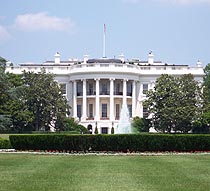-
(单词翻译:双击或拖选)
This is IN THE NEWS in VOA Special English.
 |
| Who will be the next person to live here? |
The last election without a sitting president or vice1 president as a candidate was either in nineteen fifty-two or nineteen twenty-eight. Political experts disagree. In any case, President Bush is constitutionally barred from a third term. And Vice President Dick Cheney says he will not be a candidate for president.
Every president and vice president has been white and male. The current group of candidates includes a woman, Hillary Rodham Clinton; an African-American, Barack Obama; a Latino, Bill Richardson; and a Mormon, Mitt2 Romney.
The diversity may not mean much to people who are waiting to hear more about candidates' positions. But others may feel conflicting loyalties3. A black teenager in Washington, D.C., is excited that she will be old enough to vote in her first presidential election. She says that as a woman, she hopes Hillary Clinton will win. But as an African-American, she hopes Barack Obama will win.
"I'm in, and I'm in to win," says Hillary Clinton. The New York senator and former first lady is the most popular Democrat4. But Senator Obama of Illinois has gained on her with a following that some call "Obamamania."
Another popular Democrat is John Edwards, the two thousand four vice presidential nominee5. Also in the race are Senators Chris Dodd and Joe Biden, Representative Dennis Kucinich and New Mexico Governor Bill Richardson.
In the race for the Republican nomination6, some early studies show former New York City mayor Rudy Giuliani in the lead. He gained national attention after the September eleventh, two thousand one, terrorist attacks on the World Trade Center.
Other Republicans include Arizona Senator John McCain and Kansas Senator Sam Brownback. They also include former governors Mitt Romney of Massachusetts and Mike Huckabee of Arkansas. Former House speaker Newt Gingrich is popular among Republicans. But he says he will wait until September to decide whether he will run.
Chuck Hagel announced that he too will make a decision later this year. The Nebraska senator is known for his criticism of President Bush's handling of the Iraq war. Sam Brownback is the only declared Republican candidate who has spoken out against the recent troop increase.
The presidential nominating process involves state primary elections and party meetings known as caucuses7. A lot of states are moving to vote earlier than they have, in an effort to increase their influence.
California is the most populous8 state. Yet Californians were feeling disrespected by candidates because of their June primary. Governor Arnold Schwarzenegger has just signed legislation to move it to February fifth, a day when many other states may also vote.
And that's IN THE NEWS in VOA Special English, written by Brianna Blake. I'm Steve Ember.
 收听单词发音
收听单词发音
1
vice

|
|
| n.坏事;恶习;[pl.]台钳,老虎钳;adj.副的 | |
参考例句: |
|
|
|
2
mitt

|
|
| n.棒球手套,拳击手套,无指手套;vt.铐住,握手 | |
参考例句: |
|
|
|
3
loyalties

|
|
| n.忠诚( loyalty的名词复数 );忠心;忠于…感情;要忠于…的强烈感情 | |
参考例句: |
|
|
|
4
democrat

|
|
| n.民主主义者,民主人士;民主党党员 | |
参考例句: |
|
|
|
5
nominee

|
|
| n.被提名者;被任命者;被推荐者 | |
参考例句: |
|
|
|
6
nomination

|
|
| n.提名,任命,提名权 | |
参考例句: |
|
|
|
7
caucuses

|
|
| n.(政党决定政策或推举竞选人的)核心成员( caucus的名词复数 );决策干部;决策委员会;秘密会议 | |
参考例句: |
|
|
|
8
populous

|
|
| adj.人口稠密的,人口众多的 | |
参考例句: |
|
|
|















